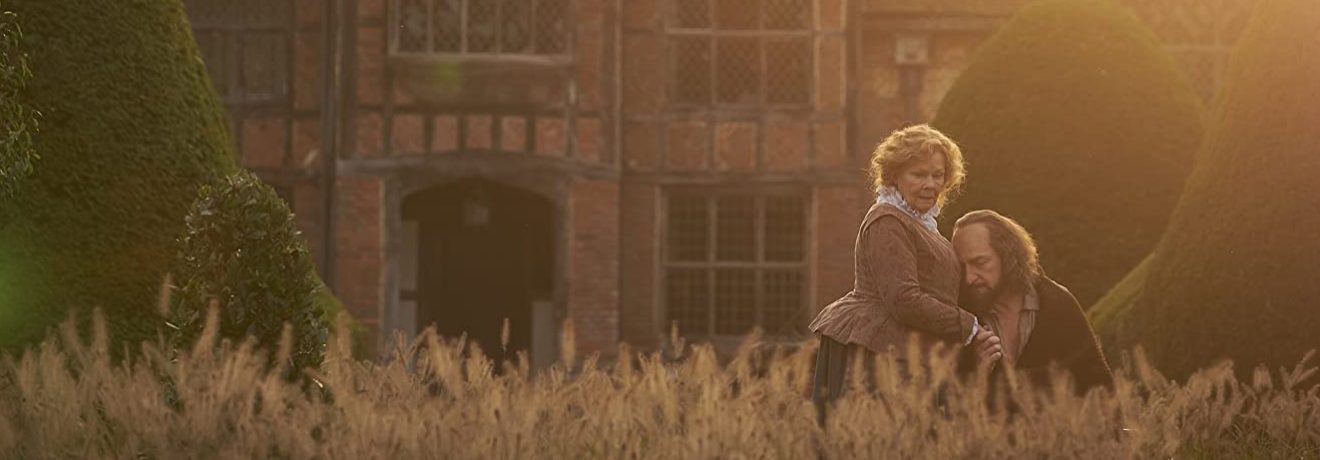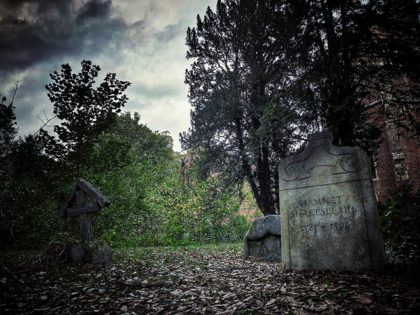Film Reviews
Kenneth Branagh’s All Is True

In SN’s last issue, I filled the last text page with a list of “Future Articles.” I promised to provide a book review and a film review for this issue. I have not had a chance to review Heather Dubrow’s new book, Deixsis in the Early Modern English Lyric, but I am keeping one promise with this review of All Is True, produced and directed by Kenneth Branagh. Branagh himself plays Shakespeare, and Judi Dench plays Anne Hathaway, while Ian McKellen appears as the Earl of Southampton. Performers who have acted on stage in Branagh’s repertory companies portray Shakespeare’s daughters and a number of other supporting characters.
In my brief reference to the film last time, I noted that it offers an account of Shakespeare’s retirement years. I also commented that the film had received a mixed review in the NY Times but that I “rather liked it.” Now that I have seen the film again on DVD, I think you’ll find that this review reinforces my view, with an emphasis on the “rather.” Many reviews have been mixed. One of the negatives for many reviewers is the prominent prosthetic nose and rubber mask Branagh uses. In an interview included among the many interesting Extras on the DVD, Branagh explains that, when he was brainstorming his make-up and his portrayal of Shakespeare, he spent a good deal of time at the National Portrait Gallery, just off Trafalgar Square, looking at the so-called Chandos portrait of Shakespeare, which is why the film’s opening moments include a picture of that portrait. Branagh claims that his appearance was influenced by that portrait. Here is the portrait, juxtaposed with two shots of the film’s “Shakespeare.” Judge for yourself how well the make-up reproduces the picture in the National Portrait Gallery (incidentally, Branagh mentions that this portrait is designated NG1, presumably because it is the first painting to be acquired for the NPG).

 Another negative for me as a reviewer is that the “Holy Trinity Church” of the film is not the church still gloriously standing in Stratford. In the interview on the DVD, Branagh explains that the film could not be made in Stratford because “all the world is in Stratford all the time,” so they had to use a church and other sites in a town close to Windsor. Surely in this digital age, it would have been possible to use exterior shots of the Stratford church—it’s the exterior shots of the wrong church that are most distracting.
Another negative for me as a reviewer is that the “Holy Trinity Church” of the film is not the church still gloriously standing in Stratford. In the interview on the DVD, Branagh explains that the film could not be made in Stratford because “all the world is in Stratford all the time,” so they had to use a church and other sites in a town close to Windsor. Surely in this digital age, it would have been possible to use exterior shots of the Stratford church—it’s the exterior shots of the wrong church that are most distracting.
We believe that Shakespeare retired to Stratford after the catastrophic fire of June, 1613, which totally destroyed the Globe on Bankside. The film is called All Is True because one of the several contemporary references to the fire uses that title to refer to the play that was being performed when the Globe burned down (several other writers refer to Henry VIII). R.A. Foakes, in his Arden Two edition of H8, notes that truth is referred to several times in the play, when the Prologue stresses that the play presents truth and when “Cranmer’s prophecy at the end is spoken as truth” (xxix in Foakes ed.): the prophecy, delivered at the christening of the infant Elizabeth I, is indeed true, if somewhat exaggerated, in its depiction of the life of the Virgin Queen. The film itself refers to truth at least twice. When a young man seeks Shakespeare out for advice, Shakespeare says, “Do you want to be a writer, and speak to others and for others? Speak first for yourself. Search within. Consider the contents of your own soul. Your humanity. And if you’re honest with yourself, then whatever you write, all is true.” At another point, Shakespeare says, “I’ve lived so long in imaginary worlds, I think I’ve lost sight of what is real, of what is true.” Sadly, his daughter asserts later, “Nothing is ever true.”
The actor and writer Ben Elton, who played Verges in Branagh’s film of Much Ado About Nothing, wrote the literate, sensitive, and inventive screenplay, which offers a believable account of the last years, necessarily fiction but making good use of the few details we have available, such as the fact that both of Shakespeare’s daughters were involved in unusual sexual experiences and that the playwright was often away from home, working in London, in the seventeen years between his son Hamnet’s death in 1596 and the burning of the Globe in 1613. (In the film, Anne implies that she has literally not seen Shakespeare in twenty years. Among the Extras on the DVD is a comment by Stanley Wells that it’s quite possible that Shakespeare lived in Stratford at least as much as in London during those years). Elton can also use to good effect the fact that Shakespeare made his will in the three years before he died, and, according to tradition, that he died after developing a chill and shortly after a merry meal with several old friends (only John Drayton, I think, is depicted in the film’s version of this meal.)
Ben Elton, by the way, was the co-author of the wonderful Blackadder series. He is also responsible for the BBC Shakespearean sitcom, Upstart Crow. I have not thought the sitcom was very good, although I’ve seen only a few episodes. They struck me as puerile, probably because it’s impossible to impose the humor of sitcoms onto Shakespeare’s time. But I’m happy to report that his script for the film is quite fine. As far as I can determine, the screenplay has not been published — more’s the pity, given how much of Elton’s text is drowned out by the musical background.
 The conceit that dominates the film is that Shakespeare is haunted in his retirement by the ghost of his son Hamnet—he regrets that he does not get back to Stratford in time for Hamnet’s burial and that a son of great promise dies at age 11. He also regrets being so long away from his wife and daughters, who make it quite clear that they resent his long absence and his unspoken assumption that the loss of Hamnet is not in any way compensated for by the continued life of his two daughters. Judith, who is Hamnet’s twin, is particularly bitter, saying twice that her father obviously feels that the wrong twin died. Shakespeare comes across as very much a man of his time, regarding women as inferior, making no effort to educate his wife or his daughters, if only to the extent of teaching them to read and write.
The conceit that dominates the film is that Shakespeare is haunted in his retirement by the ghost of his son Hamnet—he regrets that he does not get back to Stratford in time for Hamnet’s burial and that a son of great promise dies at age 11. He also regrets being so long away from his wife and daughters, who make it quite clear that they resent his long absence and his unspoken assumption that the loss of Hamnet is not in any way compensated for by the continued life of his two daughters. Judith, who is Hamnet’s twin, is particularly bitter, saying twice that her father obviously feels that the wrong twin died. Shakespeare comes across as very much a man of his time, regarding women as inferior, making no effort to educate his wife or his daughters, if only to the extent of teaching them to read and write.
Some reviewers have complained that the creator of such wonderful women as Rosalind in As You Like It and Viola in Twelfth Night could not have treated his own women so poorly. But those who know something about Shakespeare’s life will recall that he was very conventional, playing it safe about religious observance, going to court over some disagreement with a neighbor, taken to court for hoarding—conventional, then, except in his plays. As Will and Anne climb upstairs to bed on his first night home, Anne sends him to the guest room—after all, she says, it has the best bed (note that her comment means that their marital bed would be the second-best bed in the house—no wonder Shakespeare left Anne the second-best bed!). In the first half of the film, Anne calls Will “husband.” But time passes and, about halfway through, Anne starts calling him Will and brings him into the master bedroom to sleep.
The film is very dark (not only in mood but in fact because most of the scenes are played at night, and the only illumination is candle-light), and it is dreary (lourd, tres lourd, the French would say) until quite late in the narrative, when a note of hope enters the scene as Will becomes more and more acclimated to his new life and more and more accepted by his wife and daughters. I find it hard to accept the film’s portrayal of Anne as a rejected wife, bitter over her failed marriage, prematurely aged by the loneliness of her life.
In All Is True, Patrick Doyle, the composer who has written such wonderful music for most, if not all, of Branagh’s films, uses a three or four-note, dirge-like, funereal toll over and wearyingly over again. And nothing else. Only in the last third of the film does he bring in some more cheerful sounds and some melody. The “surly sullen bell” sound is too much used here. Branagh would probably argue that the decision to invent a particularly dreary and unhappy retirement for Shakespeare was influenced by the plays Shakespeare wrote at the end of his career, plays like The Tempest and, most especially, The Winter’s Tale. As little Mamillius, the Hamnet-character in that play, says, “a sad tale’s best for winter.” The late plays are full of father-daughter relationships, twins, and, in the case of WT, a lost son. The winter half of WT clearly influences the first two-thirds of All Is True. Indeed, spring never really comes to the film, as it does so wonderfully in Shakespeare’s play.
I must note that a much darker portrayal of Shakespeare’s retirement marks the 1973 play by Edward Bond, Bingo. I saw the first production of the play in London in 1974, and all I remember is the grimness of a suicidal Shakespeare and of the entire world of his retirement. A review of the 2012 revival at the Old Vic begins: “Shakespeare has retired and his theatre lies in ruins. Gone are the streets of London filth, drunken applause and royal favour. Instead, he sits in Stratford-upon-Avon among the birdsong and peasants, reluctant to face the responsibility he owes to his wife and daughter, and ensconced in a creeping nihilism and world-weary despair. As gluttonous capitalists provoke civil dissent among the peasants, Shakespeare begins to shoulder the weight of his mortality.”
 The high-point of Branagh’s film is a visit to Shakespeare from the Earl of Southampton. When his arrival is imminent, Anne tells her husband that she first heard of his patron when the Sonnets were published, in 1609. And she has worried for years about Shakespeare’s reputation, presumably a reference to the homoerotic tone of many of the sonnets. I called Ian McKellen’s performance “rather too mannered” in the previous SN. Having seen the film again, I reject that judgment and instead praise McKellen’s perfectly-calibrated performance. He enters into conversation by telling Shakespeare that he has come to visit “the greatest man in the kingdom” and that he thinks Will should return to London: “London needs you, Will. We have only Jonson now.” Shakespeare, he says, has “the most beautiful mind that ever existed in this world.” Shakespeare responds to all this praise by reciting, with great feeling, “When in disgrace with fortune and men’s eyes.” Southampton calls the poem “just flattery,” but Shakespeare replies, “Not flattery; truth.” He tells Southampton that he has always “hoped you might love me,” and the Earl rejects the advance. He says he has come to visit the poet, and to the poet he will say farewell. He then recites from memory the same sonnet before mounting his horse and galloping off.
The high-point of Branagh’s film is a visit to Shakespeare from the Earl of Southampton. When his arrival is imminent, Anne tells her husband that she first heard of his patron when the Sonnets were published, in 1609. And she has worried for years about Shakespeare’s reputation, presumably a reference to the homoerotic tone of many of the sonnets. I called Ian McKellen’s performance “rather too mannered” in the previous SN. Having seen the film again, I reject that judgment and instead praise McKellen’s perfectly-calibrated performance. He enters into conversation by telling Shakespeare that he has come to visit “the greatest man in the kingdom” and that he thinks Will should return to London: “London needs you, Will. We have only Jonson now.” Shakespeare, he says, has “the most beautiful mind that ever existed in this world.” Shakespeare responds to all this praise by reciting, with great feeling, “When in disgrace with fortune and men’s eyes.” Southampton calls the poem “just flattery,” but Shakespeare replies, “Not flattery; truth.” He tells Southampton that he has always “hoped you might love me,” and the Earl rejects the advance. He says he has come to visit the poet, and to the poet he will say farewell. He then recites from memory the same sonnet before mounting his horse and galloping off.
Near the end of the film, Shakespeare has one last exchange with Hamnet’s ghost. Standing next to his father on the shore of the lake that plays an important role in Hamnet’s life (we are told that “he was afraid of the water”), Hamnet says, “We are such stuff as dreams are made on . . .” and leaves the rest for us to fill in. Lying on his deathbed, Shakespeare wonders aloud about the life to come, and he quotes some lines from A Midsummer Night’s Dream to offer Anne and his daughters his picture of heaven:
I know a bank where the wild thyme blows,
Where oxlips and the nodding violet grows,
Quite overcanopied with luscious woodbine,
With sweet musk-roses and with eglantine. (2.1.249-252 in Oxford ed.)
In sum, Branagh has gifted us with a wonderful picture about Shakespeare in retirement. Somewhat too somber, I think, but wonderful nonetheless. The more you know about Shakespeare and the plays, the more you will find yourself quibbling with various details of those imagined years, but also the more you will appreciate the quality of Branagh’s achievement. No lover of Shakespeare should miss seeing this film. At its April, 2020, meeting in Denver, the Shakespeare Association of America has included a showing of All Is True on its schedule. If you’re going to that meeting and have not yet seen the film, catch up with it there!
